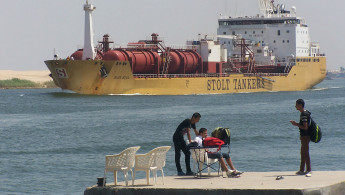Egypt keeps Suez Canal revenues secret for third month
Three months after the expansion of the Suez Canal was unveiled, the Egyptian government has yet to release any new information on revenue or shipping numbers.
In June, Egyptian authorities stopped releasing their monthly statistical reports that detailed the number of vessels and amount of cargo passing through the waterway - as well as total revenue from tolls.
"This confirms the concerns raised by specialists when the project was first announced," economist Abd al-Hafiz al-Sawi told al-Araby's Arabic service.
Not everyone has been on board with the project dubbed Egypt's "gift to the world", which was reportedly funded entirely by private Egyptian investors.
|
The government was forced to fall back on domestic sources of funding - not for nationalist motives as was promoted, but for practical motives - Abd al-Hafiz al-Sawi |
"The government was forced to fall back on domestic sources of funding - not for nationalist motives as was promoted, but for practical motives," Sawi said.
Last month, Suez Canal Authority [SCA] Chairman Mohab Mamish announced the canal had broken a new record with 70 ships traversing the canal in a single day.
"The increasing number of ships sheds light on the importance of the establishment of the new Suez Canal, to raise the canal's capacity to receive the expected increase in global trade," Mamish said.
However, a source in the SCA said the canal had seen declining revenue, despite the increasing number of ships.
See Also: Photo gallery: History of the Suez Canal
The source added that falling revenues was down to a decline in Special Drawing Rights, a form of quasi-money based on a number of major world currencies, which are used to calculate revenues.
"The canal's revenues are one of the important sources of money for Egypt after tourism, exports and remittances from expats," the anonymous source told al-Araby's Arabic edition.
"The government must be transparent and announce its revenues either monthly or quarterly as is the protocol for these kinds of economic institutions."
The new section of the canal was built at a reported cost of $9 billion, running part of the way alongside the existing canal connecting the Red Sea and the Mediterranean.
In August, President Abdel Fattah al-Sisi inaugurated the "new" Suez Canal in a lavish ceremony, in an attempt to boost a failing economy and Egypt's international standing by expanding the vital waterway.
Egypt has recently proposed another new channel, which will connect to the Suez Canal via Port Said, thereby cutting down waiting times for ships entering the canal.





 Follow the Middle East's top stories in English at The New Arab on Google News
Follow the Middle East's top stories in English at The New Arab on Google News
![Netanyahu furiously denounced the ICC [Getty]](/sites/default/files/styles/image_330x185/public/2024-11/GettyImages-2169352575.jpg?h=199d8c1f&itok=-vRiruf5)
![Both Hamas and the Palestinian Authority welcomed the ICC arrest warrants [Getty]](/sites/default/files/styles/image_330x185/public/2024-11/GettyImages-2178351173.jpg?h=199d8c1f&itok=TV858iVg)
